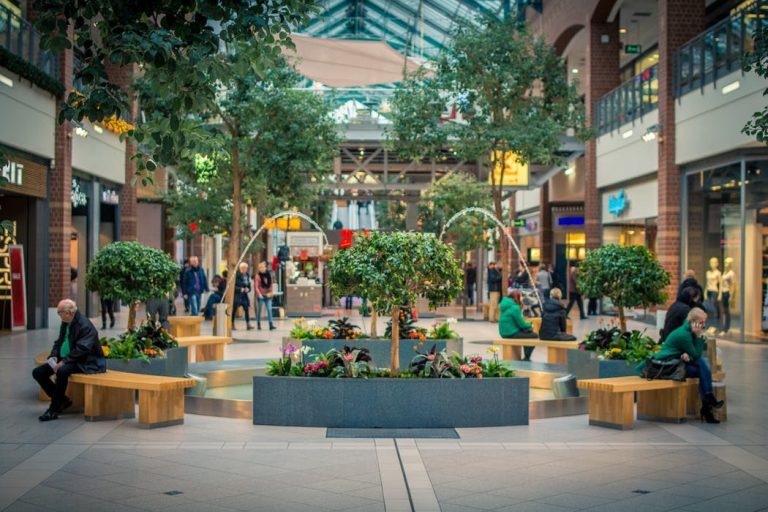You can tell who genuinely cares about the long-term well-being of the planet because those who do embrace their personal responsibility to care for it. It’s one thing to suggest that environmental policy needs to change, but it’s another thing altogether to make actual changes in your life.
It can often feel like the only way to reduce your footprint is to live with less. And sometimes that is true in a literal sense. We’ve written before about the inherent benefits of minimalism, after all.
But, what’s also true is that living in an environmentally friendly manner can actually catapult our standard of living, and not just in a “I feel good about myself because I recycle” kind of way — but in a meaningful, long-lasting way that grants true wellness in our lives.

They Garden
Organic gardening brings with it a wealth of benefits for the planet. It allows you to rely less on the pollution-heavy agricultural industry. Plants convert carbon dioxide into oxygen — a crucial process. The way in which birds and insects all interact with your garden creates a distinct ecosystem there in your backyard.
Beyond that, gardening makes for humans who have better emotional health, and it provides an opportunity to connect.
CNN reports gardening has been proven to:
- Provide stress relief
- Bolster the mental health of those who suffer from depression, low mood, and bipolar II disorder
- Promote exercise
- Lower the risk of dementia
- Introduce nutrition since you’re more likely to eat fruits and vegetables you’ve taken the effort to grow yourself
Additionally, gardening has been lauded by experts as one of the best intergenerational activities. Community gardens are a valuable way to foster unity within neighborhoods, and real estate experts note the mere presence of plants and flowers creates curb appeal for a home. So down the road there could even be a financial reward for gardening.
They Buy Eco-Friendly Cleaning Products
Who doesn’t like a clean house? The problem, though, is often cleaning house means we’re utilizing products that are harmful to both ourselves and the environment.
In an interview with Healthline, Allen Rathey, principal of The Healthy Facilities Institute noted that harmful chemicals are found in bleach-based products, degreasers containing 2-butoxyethanol, also known as butyl cellosolve or ethylene glycol butyl ether (EGBE), and disinfectants. Essentially, they’re primary products we use.
Additionally the institute notes, “The Environmental Working Group called out several harmful products by name in its 2012 Hall of Shame report. The organization also lists more information about products it recommends.”
Some green cleaning companies have taken a stance against using harmful chemicals in their products. Brands like Method and Seventh Generation have lists of products they refuse to utilize because of how those ingredients harm people and the planet.
Purchasing green cleaning products means you’re going to protect yourself, your family, and anyone else who comes into your home.
They Commute Less
Those of us who recognize the threat our vehicles pose to the environment make an effort to reduce the amount of time we spend in those vehicles.
The Union for Concerned Scientists writes, “Collectively, cars and trucks account for nearly one-fifth of all US emissions, emitting around 24 pounds of carbon dioxide and other global-warming gases for every gallon of gas. About five pounds comes from the extraction, production, and delivery of the fuel, while the great bulk of heat-trapping emissions—more than 19 pounds per gallon—comes right out of a car’s tailpipe.”
We know that, and that is why those endeavoring to be environmentally friendly often choose to shorten their commute by living closer to work, riding their bike, or utilizing public transportation or carpooling.
Did you know that making those choices can drastically improve your overall quality of life?
Across the board, long commutes are bad for your health. When you have a regular long commute, your cholesterol, anxiety levels, risk of depression, and blood sugar and pressure all rise, while your amount of sleep, fitness level, and overall life satisfaction fall. Additionally, one study found that if a spouse commutes at least 45 minutes, the couple is a whopping 40 percent more likely to get divorced.
Driving less and walking or biking more may have been a choice made for the environment, but it can potentially become one that actually changes your life — or even saves a relationship.
They Further Environmental Goals
Some among us are so invested in the health of the planet that we use our time, education, and money to further proactive efforts to reduce the impact humanity has on Earth. Whether an individual decides to make an entire career of it, or decides to budget in such a way that they can financially support those who have made a career of it, adopting eco-friendly practices takes focus, which can lead to some sacrifices.
If you enter a professional field, you make the choice to — at least temporarily — forego others. Similarly, those who give financially to green efforts are making the decision not to give to other charities, and most significantly not to spend that money on something that would directly benefit themselves.
However, even such sacrificial choices often benefit those who made them.
Green Entrepreneurs
Entrepreneurs are a special breed of people who are willing to embrace a distinct challenge and step out on their own where others have never gone before. They’re the individuals who are willing to accept risk for the sake of their passions.
As Arizona State University writes in their overview of entrepreneurs, “At first, entrepreneurs may have to do everything themselves, including taking on all the executive roles typically done by multiple people at a larger organization. While autonomy is often the biggest draw for being your own boss, you must have a broad set of professional skills and know the fundamentals of business to be successful.”
In other words, it’s no joke. Those who pursue green entrepreneurship are making serious sacrifices. However, even there, they are sacrifices with the potential to seriously reap rewards. As environmental awareness grows, so does consumer demand for eco-friendly products. Thus, it’s never been a more lucrative time to become a green small business owner.
Green Givers
We all understand innately that if you’re fortunate enough to have more than you need, there’s value in extending a hand to those who do not have all they need. It is a beautiful thing when those who can give to those who need.
The first step in deciding where to donate money, is considering what you care most about. Individuals who donate to green charities are prioritizing the health and well-being of the planet and everyone on it.
But those who are on the receiving end of donations aren’t the only ones who benefit.
According to Terri Yablonsky Stat for the Chicago Tribune, “Countless studies have found that generosity, both volunteering and charitable donations, benefits young and old physically and psychologically. The benefits of giving are significant, according to those studies: lower blood pressure, lower risk of dementia, less anxiety and depression, reduced cardiovascular risk, and overall greater happiness.”
While it may seem counterintuitive to some, if you want to feel better physically and emotionally, giving is one of the fastest ways to make that happen. There’s a real, sometimes even tangible, benefit to looking beyond oneself that just can’t be denied.
Sometimes, going green gets bad press. It can seem that if you really want to make a difference, there will at some point be a cost. Certainly, eco-friendly choices often require some loss of convenience or ease.
But the research-backed reality is that a good number of life-changes we make on behalf of our home planet, end up paying us back tenfold. It turns out that the side of effects of being a more thoughtful, more active participant in life is that our physical and emotional health gets a boost.
This, in turn, often means we enjoy life more. We have not the duty, but the privilege of connecting with our families and our communities. We are eager to contribute our time and resources not because we have to, but because we have the precious ability to do so. Ultimately, when we do something for others, we are also kind of doing it for ourselves, and it shows.





Leave a Comment